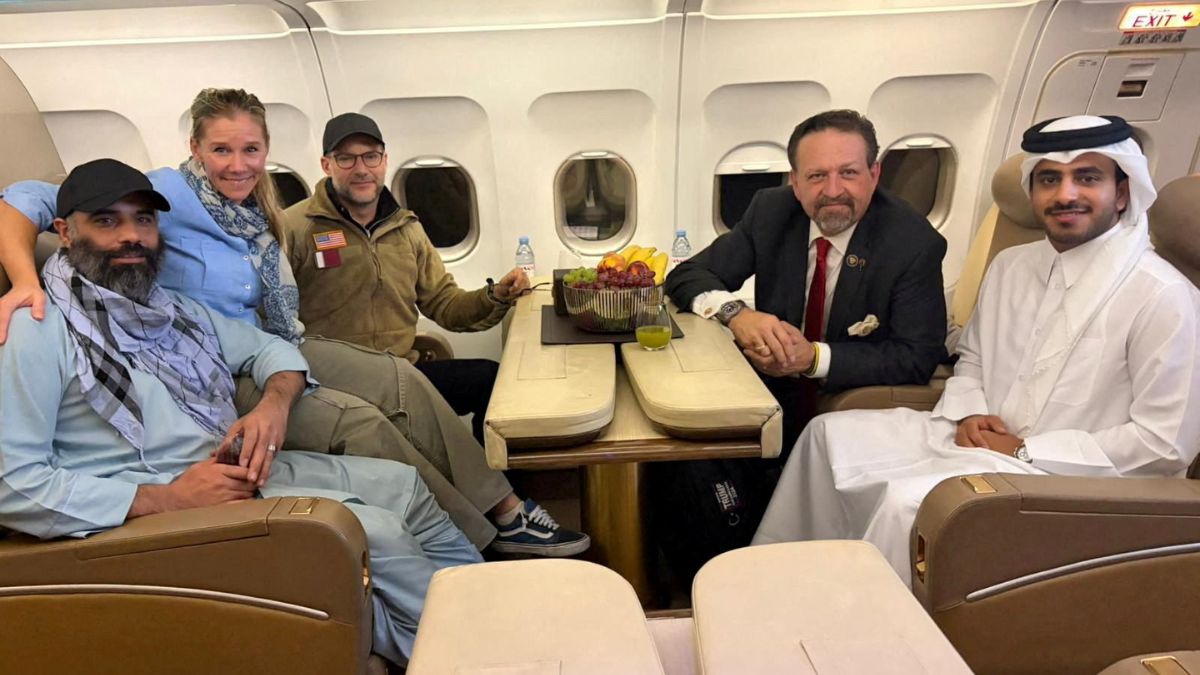The Taliban government of Afghanistan has released American citizen Amir Amiry after months of intense negotiations involving the United States and Qatar.
His release marks the latest development in a series of diplomatic efforts that have gradually led to the freedom of several foreign nationals held in Afghanistan since the Taliban retook control of the country four years ago.
Amiry’s return to freedom comes at a time of heightened tensions between Washington and Kabul, driven by US President Donald Trump’s recent call to regain control of Bagram Air Base and ongoing concerns about US citizens still held by the Taliban.
It also has put a spotlight on the critical role Qatar continues to play as a mediator in disputes across the region.
How the release of Amir Amiry was secured
Amir Amiry, 36, had been in Taliban custody since December 2024. The process to secure his release began earlier this year and involved numerous discussions between US representatives, Qatari mediators, and Taliban officials.
These efforts culminated on Sunday, when Amiry was handed over to Qatari representatives and transported to Doha. From there, he is travelled back to the United States, according to US media citing sources familiar with the matter.
The US does not currently operate an embassy in Afghanistan, having closed its diplomatic mission following the Taliban’s takeover of Kabul in August 2021.
As a result, all American engagement with the Taliban is carried out indirectly, with Qatar acting as a crucial intermediary.
Adam Boehler, the Trump administration’s special envoy for hostage affairs, travelled to Kabul to meet with Taliban officials in recent weeks, including Afghanistan’s foreign minister, Mawlawi Amir Khan Muttaqi.
According to a statement by Taliban deputy spokesman Hamdullah Fitrat, during these meetings, Muttaqi said that the Afghan government aims to address the detention of foreign nationals through diplomatic means rather than political leverage.
Editor’s Picks
Fitrat stated that Amiry’s release showed that the Taliban government “does not view issues concerning foreign nationals from a political perspective and reiterated that diplomacy provides pathways for resolving such matters.”
The exact circumstances surrounding Amiry’s presence in Afghanistan and the reasons for his detention remain unclear.
Officials have not provided details about his activities in the country, and there is no public record explaining why he was initially taken into custody.
How Qatar played a pivotal diplomatic role
Qatar’s involvement was instrumental in bringing about Amiry’s release. Over the past several years, Doha has emerged as a key mediator in a range of international conflicts, leveraging its diplomatic relationships to broker negotiations between parties that have no direct channels of communication.
In this case, Qatari officials facilitated meetings between US representatives and Taliban leadership, allowing discussions to move forward when other avenues were unavailable.
Qatari Minister of State Mohammed Al-Khulaifi highlighted his country’s broader commitment to peace and negotiation in a statement issued by Qatar’s foreign ministry, saying that Qatar “remains committed to advancing mediation efforts aimed at achieving peaceful solutions to conflicts and complex international issues.”
The US Secretary of State, Marco Rubio, publicly thanked Qatar for its role, highlighting the partnership between Washington and Doha in efforts to bring home Americans detained abroad.
“We express our sincere gratitude to Qatar, whose strong partnership and tireless diplomatic efforts were vital to securing his release,” Rubio stated on X.
He added, “While this marks an important step forward, additional Americans remain unjustly detained in Afghanistan. President Trump will not rest until all our captive citizens are back home.”
Beyond Afghanistan, Qatar is currently involved in high-profile mediation efforts related to the war in Gaza, negotiations to secure the release of Israeli hostages held by Hamas, tensions between Russia and Ukraine, political disputes in Venezuela, and ongoing conflicts in the Democratic Republic of the Congo.
Previous releases and ongoing detentions
Amiry’s release is part of a broader series of successful negotiations this year that have seen several US citizens freed from Taliban custody.
Earlier this year, in January, businessman Ryan Corbett and another American, William McKenty, were released shortly after Trump’s second term began.
In March, two more Americans were freed: George Glezmann, who had been detained for over two years while on a cultural trip, and Faye Hall, who was taken into custody for operating a drone without authorisation.
In mid-September, the Taliban also released a British couple who had been held since February, demonstrating that Qatar’s mediation efforts extended beyond American citizens.
Despite these developments, at least three Americans remain in Taliban custody.
Among the detainees is Mahmood Habibi, who was detained on August 10, 2022. His case has become a focal point for families of detainees, who continue to push for comprehensive agreements that secure the release of all captives.
Ahmad Habibi, Mahmood’s brother, released a statement expressing cautious optimism following Amiry’s release.
“We are grateful that senior officials at the State Department and National Security Council have repeatedly assured us that any deal they do with the Taliban will be ‘all or nothing’ and they have explicitly assured us that they will not leave my brother behind,” he said.
He added, “All Americans should be happy for that. But my brother is also an American and he has been held by the Taliban since August 10, 2022, without any acknowledgment or ability to speak with his wife. The Biden Administration did nothing for us. We have faith in President Trump.”
Additionally, US officials have indicated that there is a fourth case involving Paul Overby, another American who is believed to be deceased.
However, this has not been conclusively confirmed.
How US-Taliban relations are faring
The timing of Amiry’s release coincides with a period of escalating rhetoric between Trump and the Taliban leadership.
Earlier this month, Trump announced that his administration was actively working to reestablish US control over Bagram Air Base, a facility that was central to American military operations in Afghanistan for nearly two decades following the September 11, 2001, attacks.
The 2020 agreement between the United States and the Taliban, signed during Trump’s first term, outlined the complete withdrawal of American troops from Afghanistan and did not include provisions for retaining Bagram or any other military installation.
In August 2021, US forces withdrew from the country, and the Taliban subsequently took control of Bagram along with other strategic locations.
Since returning to office, Trump has made regaining control of Bagram a priority, even warning that “bad things” would happen if the Taliban refused to cooperate.
Military analysts and officials have cautioned that reoccupying the base would require a significant commitment of resources, potentially involving the deployment of over 10,000 troops as well as advanced air defence systems to protect the facility.
Taliban leaders have firmly rejected the idea, framing it as a violation of Afghan sovereignty. The refusal has added tension to ongoing negotiations, even as both sides have engaged in dialogue over the release of detainees.
How Taliban-led Afghanistan is dealing with diplomatic challenges
The Taliban government has been seeking to emerge from the international isolation it has faced since taking power.
Their leadership has repeatedly pointed out a desire for foreign investment and economic partnerships to rebuild Afghanistan’s struggling economy, which has been severely impacted by years of conflict, sanctions, and the withdrawal of foreign aid.
Despite these overtures, progress has been limited. Most countries have refrained from recognising the Taliban as Afghanistan’s legitimate government, and international organizations have been cautious in their engagement.
Russia is currently the only nation to have formally recognised the Taliban government.
Last week, Taliban representatives were denied entry to the United Nations General Assembly.
Qatar, which maintains relations with the Taliban, has consistently urged the Afghan leadership to address international concerns, particularly regarding human rights and the treatment of women.
Doha has pressed for improvements in women’s education and access to employment, but these issues remain contentious and have hindered Afghanistan’s reintegration into the global community.
With inputs from agencies

)

